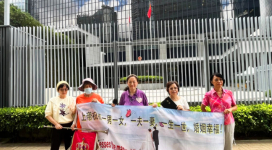Kenya is shutting down world's largest refugee camp in Dadaab that caters 350,000 Somalis citing national security as the reason, despite the United Nations plea to reconsider the decision.
Interior Minister Joseph Nkaissery said a task force has been organized to handle the closure, and to start with a force repatriation of the refugees.
The decision also drew deep concern of the US on the uncertainty of the lives of the refugees if repatriated.
Kenya, Nkaissery said, suffered from spate of attacks by Islamist Somali group al Shabaab, which has used Dadaab as their launching ground because of its proximity to the Somali border
"The government will commence shutting down the complex of Dadaab," Nkaissery briefly said without giving specific plans of the government aside from the repatriation during closure.
U.S Secretary of State John Kerry has urged Kenya to reconsider the repatriation plan and to keep its longstanding leadership role in protecting and sheltering victims of violence and trauma.

Dadaab has become home to 600,000 Somalis and refugees from South Sudan. Many have been born there, and others have lived there for decades. The government is determined to close the complex because hundreds of Kenyans died in a spate of attacks mostly in Nairobi.
The original plan to close Dadaab and a force repatriation surfaced last year, but the UN had managed to sway Kenya's decision reminding it of the 2013 tripartite agreement it had signed with UNHCR and Somalia stipulating a voluntary repatriation.
Last January the UNHCR aimed to repatriate 50,000 refugees, but the figure was made difficult by Somali government's focus in battling the al Shabaab.
Nkaissery said one reason they are pushing through with the closure plan is because there has been a very slow process on the implementation of the tripartite agreement.







